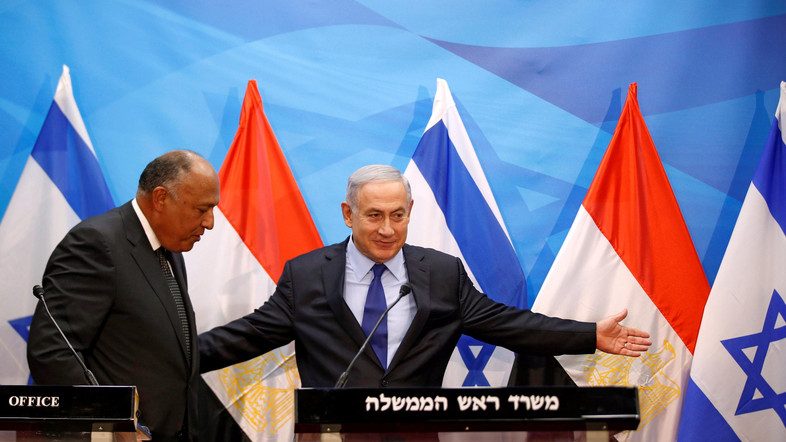Cairo-Egypt’s Foreign Minister Sameh Shoukry called on Sunday during the first visit of its kind to Tel Aviv in nine years, on reviving the stalled peace talks between the Palestinians and Israelis.
“It is no longer acceptable to claim that the status quo is the most we can achieve of the hopes and aspirations of the Palestinian and Israeli peoples,” Shoukry said, adding that a solution to the Palestinian-Israeli conflict was not out of reach.
Shoukry’s visit is considered the first active move after Egyptian President Abdel Fattah al-Sisi had offered two months ago to start a “warm peace” between Israel and its Arab neighbors.
The Egyptian Foreign Ministry described the talks between Shoukry and Israeli Prime Minister Benjamin Netanyahu on Sunday as “important.”
Diplomatic sources told Asharq Al-Awsat: “Shoukry’s visit to Israel, which is the first by an Egyptian foreign minister in nine years, shows there is a progress in the direction of reviving the Egyptian initiative for peace.”
A diplomatic source close to the Egyptian foreign ministry told Asharq Al-Awsat: “The Turkish-Israeli rapprochement might not concern Egypt as much as Cairo is looking for a possibility to achieve progress in the region, which needs quick action.”
The diplomatic source said Shoukry’s visit to Tel Aviv aims to look for new horizons in the region, particularly amid the current thorny files and the threats of terrorism and extremism facing the region.
The source added that Egypt wants a timeline for ending the Israeli occupation and is working on discussing the issue with the Palestinian side and other concerned parties, particularly Paris.
Concerning the Syrian file, the source said that the picture is still unclear, and that it might be clearer in the next weeks, if President Bashar Assad shows certain responsiveness to solving the crisis.
From his part, Netenyahu welcomed the Egyptian initiative and called on Palestinians to follow the courageous example of Egypt and Jordan and enter direct negotiations, considered the only way for achieving peace.
Netenyahu said: “This is the only way we can address all the outstanding problems between us, and turn the vision of peace based on two states for two peoples into reality.”
The last visit of an Egyptian foreign minister to Israel was in 2007. Sisi called last May for a comprehensive agreement between Israel and the Palestinians.
Israeli-Palestinian negotiations were halted in April 2014 when Israel expanded their settlement policies on territories occupied during the 1967 war.
Shoukry’s visit also coincides with the French efforts to revive peace in the Middle East, after Paris announced its initiative to hold an International Conference for Peace at the end of this year to gather all parties concerned by the conflict. However, the French efforts are still troubled.
During a joint press conference with the Israeli prime minister, Shoukry said his visit to Israel comes at a crucial and challenging juncture for the Middle East.”
Shoukry said his visit falls within the context of Sisi’s call for a comprehensive agreement between Israel and the Palestinians.
“If implemented, the achievement will have a far reaching, dramatic and positive impact on the overall situation in the Mideast region,” he said.
He added: “The Palestinian-Israeli conflict has raged on for more than half a century claiming thousands of victims, and crushing the hopes and aspirations of millions of Palestinians to establish their independent state based on the 1967 border, with east Jerusalem as its capital, as well as the aspirations of Israelis to live in peace, security and stability.”
The Egyptian minister also spoke about the dreadful spread of terrorism in the region. He said terrorism now represents “an existential threat to the peoples of the region and the world at large. No person, group or people are exempt; none are immune from this threat.”
Egypt is the first Arab country to establish official relations with Israel following its 1979 peace treaty.
Shoukry said he was visiting Israel to achieve a two-state solution based on “justice, legitimate rights and a mutual willingness to coexist peacefully in two neighboring and independent states, in peace and security.”
He said: “The plight of the Palestinian people becomes more arduous every day, and the dream of peace and security moves further out of the Israeli people’s reach as long as the conflict continues.”
Commenting on the visit, Egyptian member of the parliamentary foreign affairs committee Anissa Hassouna said Shoukry’s presence in Tel Aviv is a proof there is a strong breach in the deadlocked peace talks.
“Sending Egypt’s foreign minister to Tel Aviv means there is a progress in the direction of implementing the initiative of President Sisi to find a just solution for the Palestinian case,” Hassouna told Asharq Al-Awsat.
She said: “Despite mainly tackling the Palestinian issue, (Israeli and Palestinian officials) also spoke about the situation in Syria, the Israeli-Turkish rapprochement and efforts to fight terrorism.”
Shoukry’s visit comes ahead of the Arab Summit, which is expected to be held at the end of this month in the Mauritanian capital.
